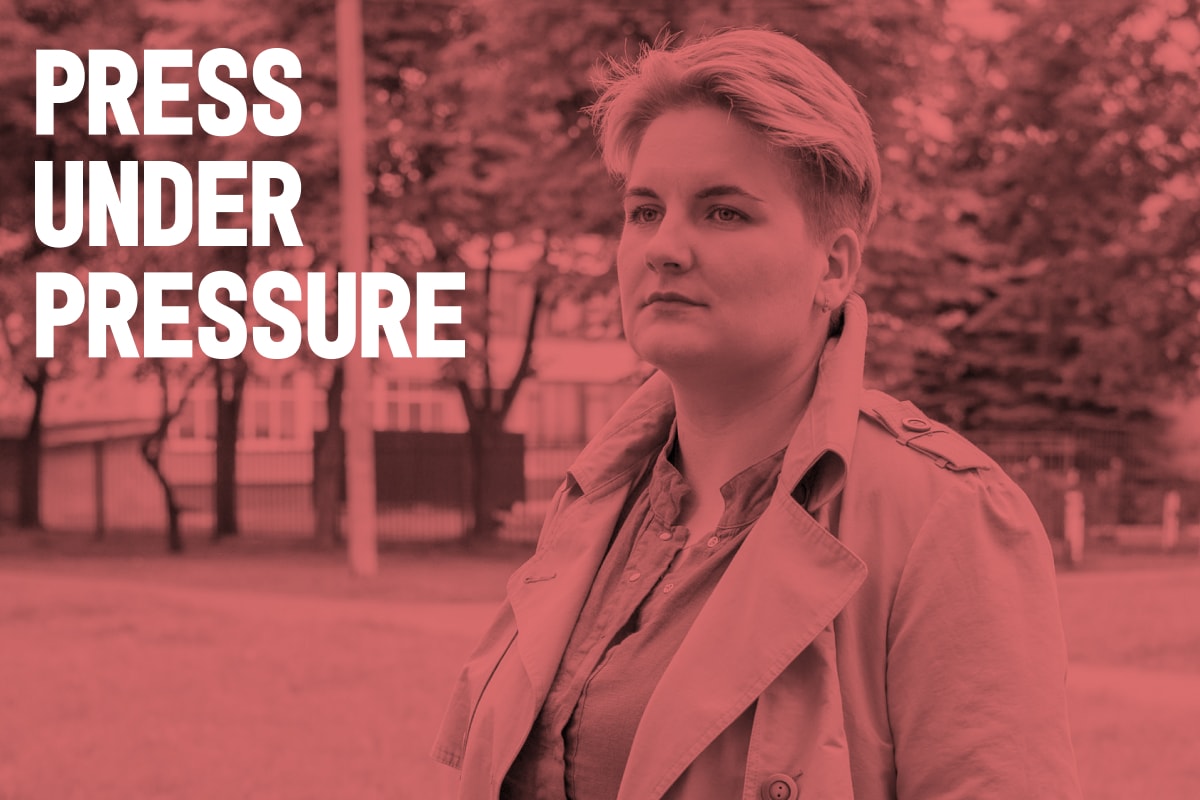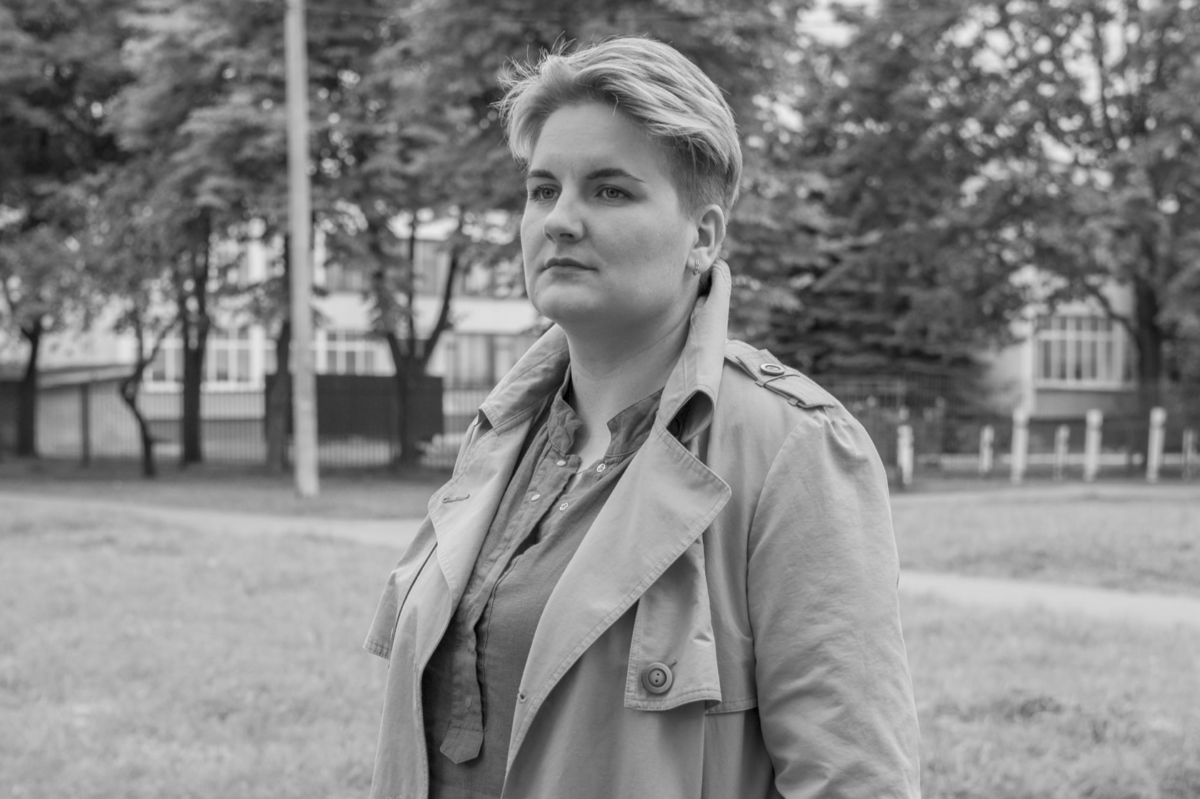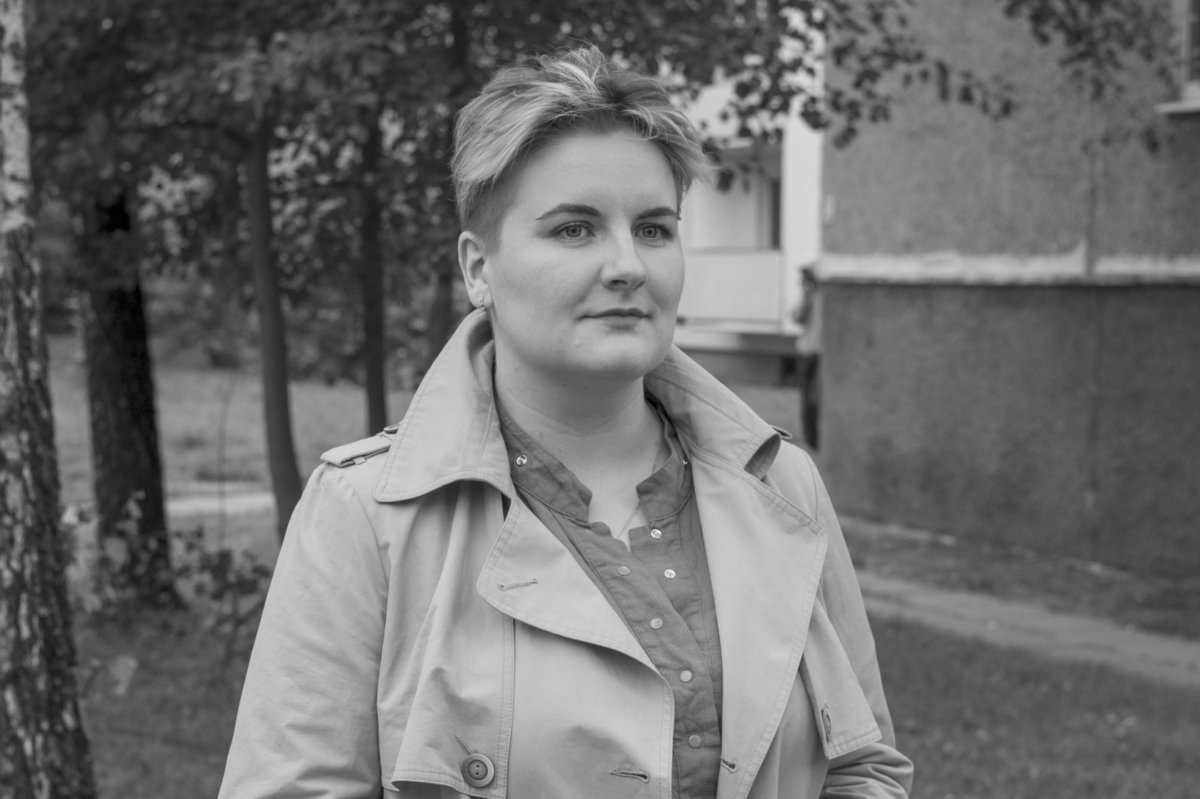
On August 10, 2020 TV journalist Alena Dubovik was working at the protests at Kalvariyskaya Street in Minsk. Later, she went to the police department to write a statement about the disappearance of her cameraman, who had been detained. The application to the police was refused. And Alena also ended up in a prison truck. She spent three days in the pre-trial detention center on Okrestina Street. When she got out, she went straight to hospital for six days. To treat the injuries received from being beaten while held in the prison isolation unit.
On August 10, I was covering the protest rallies. I went live on the air by phone and filmed short videos about what was happening. I finished up my work at about nine o’clock in the evening near «Korona» on Kalvariyskaya Street, where the military threw a stun grenade into the crowd. Afterwards, I filmed some video of a military officer pointing his gun at a woman and shouting: «You want a second Ukraine here or what?» When he noticed that I was filming all this, he quickly redirected the gun at me and yelled obscenities to stop me filming.
I was terrified. I never expected that anything of the kind was possible or that I would be the one to witness it. I went on air again and spoke about what had happened. I was told: «Alena, get away from that place! Try to get out!»
I attempted to walk out of the conflict scene and headed towards the Parus business centre. On my way there I noticed that a man dressed all in black and wearing a black mask was following me closely. I got really scared. I cannot say for sure if he was a police collaborator, but at that point I had a feeling he had to be.
I turned around abruptly and ran into the courtyard where I rang the doorbell of the first apartment I came across, said I was a journalist and I was being chased, and asked for help. A woman let me in and offered me food. She was really concerned about me and did want to let me go. I spent about 20 minutes in her home, but it was clear that I had to move on. Getting a taxi was an unrealistic thing, so I called our cameraman. I knew he was also in the field and that he might be somewhere close. However, his phone was unavailable. I realized something had happened and called his wife Tanya, who also works for Belsat TV. She said: «They detained Vitalik. I can come and pick you up».

Alena Dubovik
We decided to check at the Tsentralny district Directorate of Internal Affairs on our way. Somehow we thought that if Vitalik the cameraman had been detained near the Yubileynaya hotel, he was likely to be held there.
We spent 15–20 minutes at the directorate. There were about 20 other people there, all of them in a terrible, disoriented state. They were crying. Elderly parents in search of their children were among them. No information was available. The policeman who came out of the directorate building was very rude. He either mouthed off and snapped at people or just ignored them. Hardly had we finished writing the statement about our cameraman having gone missing when a prison truck, a minivan and an ambulance pulled by. They surrounded us, riot policemen rushed out of the prison truck and arrested everyone shouting «Get’em!» Every single person standing there.
There was this woman aged about 60 in the prison truck. She was crying all the time and saying: «I was looking for my son. My son is missing. I didn’t take part in anything». Her husband was sitting beside her. The «soft» riot police guy – there were three of them in the truck with us – was soothing her: «Don’t worry, they’ll sort it out. If you’re not guilty, they’ll let you go. You see, we’re doing this for you and for your sake! Look what’s going on the streets, you’re in danger!» Of course, though, they were not let go.
Neither did they let go a 52-year-old woman and her husband. The couple lived outside the city and came to look for their son, too, as he could no longer be reached over the phone. This woman spent three days in the same cell as I did and kept listening out for voices in the hallways hoping to hear her husband’s or son’s voice or surname. On the second day she finally figured that her husband was being kept in the adjacent cell. It was only after she was freed that she learnt what had happened to her son. These were the kinds of people who were being detained.
I don’t know how to describe all this with a word you won’t be ashamed to say aloud. I don’t want to swear. I would use a cuss word once in a while before, but such words give me shudders after Okrestina prison, because everybody over there swears instead of using ordinary language. And now, when I hear somebody cuss, my thoughts immediately carry me back to that place…
We were transferred from our prison truck to another one, the so-called truck with cubicles. Men and women were transported separately. Tanya and I were both sitting in a tube meant for one person only. It was extremely stuffy. The walls were all covered with blood. We had a phone: Tanya had managed to keep hers. We texted people on the outside to let them know we had been detained.
They drove us to Okrestina, and that is where the toughest part began. I felt like a powerless animal at the mercy of its master. They loaded us, the women, out to the exercise yard, an outdoor room with bars overhead, and ordered us to stand along the wall…
I was the first one to be searched and faced a female superintendant called either Karina or Kristina. The search was very rough: she undressed me in a rude manner, threw my clothes around, ripped the inner soles out of my tennis shoes and made me squat naked. Other girls shared later on that if you were having your period, she would order you to remove your pad. Outright humiliation.
I was pushed out to the hallway after the search, wearing a bra only, my pants unzipped. I had to get dressed right there.
And then I saw something I had not expected to see at all. There were guys kneeling completely naked, hands behind their backs, faces down. The entire hallway – its floor and walls – was blood-stained. You could hear the superintendents swearing and those guys groaning and weeping.
At that point I realised no one would release me. The law had stopped functioning, if it ever had at all.
A thought flashed in my head: this must be exactly the way you feel when you get captured by terrorists. All the law enforcement officers whose duty it is to guard and protect are now mutilating and murdering us.
After all the girls had been searched, we were directed to a cell with four beds and 35 people in it. It was the night of August 10–11. Afterwards I realized this first had been a true luxury resort: the following night we were as many as 50.
The women were crying. The thing that really saved me was that I was not alone. I had Tanya staying with me. It would have been a lot harder to get through all that without her.
I watched Sobibor, a Konstantin Khabensky movie, literally a year ago. A scene portraying well-groomed and dressed Jewish women being forced into a cell and simply gassed to death had etched itself into my memory. I was sitting on the upper level of that bunk bed, looking at all our girls and thinking that one could just let gas into the cell and we’d all be gone. We had no identity papers or possessions. How the hell could you prove if we had been there or not? Those were the kind of thoughts dashing through my mind.
We slept on a mattress and passed pillows and blankets over to the girls who lay on the floor. They spread them out and piled up on them. Some slept under the bunk bed, others on the table. A girl spent three days inside a small cabinet – there was one with no doors or shelving. When asked «Are you comfy?» she answered: «At least I can’t down fall this way».
They detained us on August 10th and only brought us food (salty oats and bread) on the 12th in the morning, and the next time the day afterwards. Tea was offered twice. That’s all we ate in three days.
We had no toilet paper, just a tap with chlorinated water and a plastic bottle. We filled it with water, put it near the toilet and just washed ourselves.
We lacked air, so we asked to open the hatch they gave us food through. But the blond female superintendent said: «You won’t croak». Well, it’s true: we didn’t.
Many were desperate. One of the girls had a ligament rupture. Her leg was so swollen that we could not take her pants off to apply a cold compress. We asked for an ambulance, but they brought NO-SPA (drotaverine) instead. To treat a swollen leg! The girl spent two days lying under the bunk bed to prevent others from stepping on her leg accidentally.
There was a girl dragged by the riot policemen into a prison truck and beaten up by a whole group of them. Her eye was bloodshot, half of her head was swollen, and she had been marked out with yellow paint. I later read that people with hipster or subculture-like looks were marked that way. The girl had dreadlocks.
Particularly aggressive detainees were marked with red paint. Such a mark meant an entitlement to beat people half to death, whereas those with a black mark became eligible to be fully beaten to death. They said people with no identity card and drunken ones were marked black. However, this is just a speculation.
When you are confined in a cell, it seems everyone has forgotten about you and nobody is looking for you. It is an utter information vacuum. We were constantly staring out of the window. At some point the girls started shouting: «There is someone wearing a Press vest!» I rushed to the window and saw our cameraman. That was a boost. I understood that people were looking for me and making an effort, after all, but I just hadn’t been aware of it.
Being beaten on your back and legs is a simple fact of life at Okrestina, as well as the humiliation of being dragged and pushed into a cell like some pig to the slaughter.

Alena Dubovik
The trial took place on August 13 in the morning.
I was guided to the judge’s chamber. The judge, a well-groomed nice young lady, made quite a friendly impression. She read out my charges and the record stating that I had been detained on the 11th. In fact, I already was at Okrestina at that time. According to the record, I had been detained near the Riga mall shouting out slogans, taking part in a rally, gesticulating intensively and failing to obey police orders. The entire evidence against me consisted of testimonies by three policemen from the Partizansky district Directorate of Internal Affairs. I thought nothing could surprise me after those three days at Okrestina, but this trial and charges were totally shocking.
(By the way, no one gave a damn that I was a journalist and had three small kids.)
Four hours later I was taken to another trial with a different judge. She was perplexed when I said I had already had a trial.
I spent three days at Okrestina – beaten, hungry, under psychological pressure. I was tortured, yet I have no documents to prove it. I have no idea why I was kept there. Neither do I know who will be held responsible for the fact that my kids spent all this time without me.
They released me and made me sign a warning, stating that I pledged not to take part in any other rallies and regret having done so before. I feel really bad now about signing it. Yet in front of the camera I said: «I have nothing to regret, because I was not participating. I was doing my job. And if there is any further need to, I will keep on «participating».
I was released on August 13th and spent the night at home. The night was a tough one. I was feeling very bad. I almost fainted on the 14th in the morning, and my husband had to support me to stop me from falling down. I suffered from terrible abdominal pains and could not use the bathroom, so we visited the outpatient clinic. When the gynecologist heard I had been at Okrestina, she called the head doctor and they performed a complete checkup very quickly. They were very courteous, nice and polite.
Following the checkup, an ambulance picked me up right at the outpatient clinic. I was admitted to hospital number five with a suspected ovary rupture. Luckily, the diagnosis was not confirmed, but my blood test results were not good and I was still having abdominal pains, so I was transferred to the emergency care hospital. A urologist and a surgeon examined me there and diagnosed me with a non-penetrating abdominal injury, lower abdominal wall impact injury, bladder impact injury and something to do with my lumbar. I spent six days at the hospital.
Terms and conditions
Partial or full reprint is permitted subject to following terms of use.
An active direct hyperlink to the original publication is required. The link must be placed in the header of the reprinted material, in the lead or the first paragraph.
Reprints, whether in full or in part, must not make changes to the text, titles, or copyrighted photographs.
When reprinting materials from this page, attribution must be given to the Press Club Belarus “Press under Pressure” project, collecting evidence of repression against independent media and journalists in Belarus.